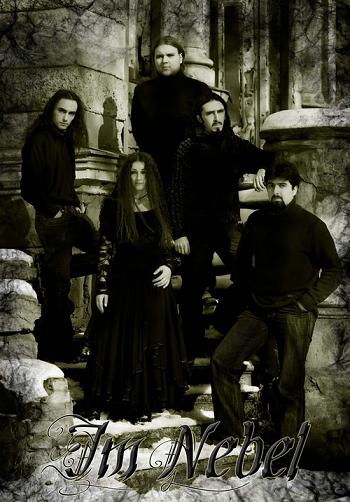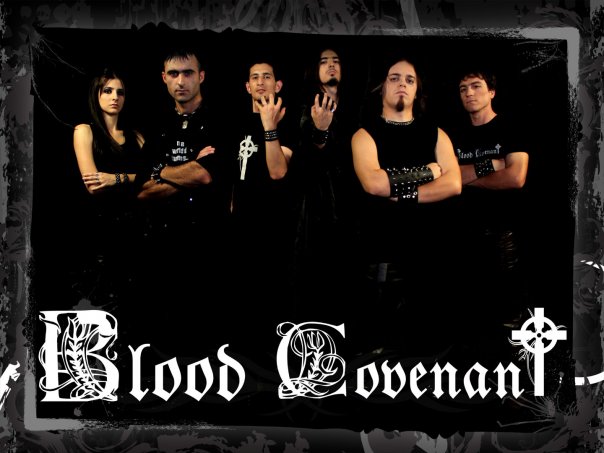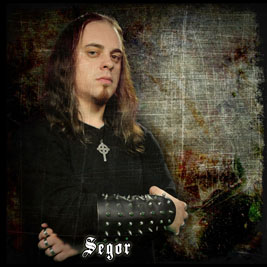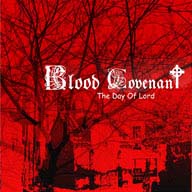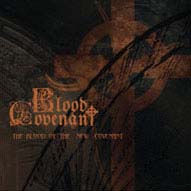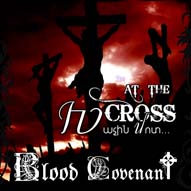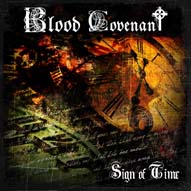Additionally Germany's biggest Metal Webzine POWERMETAL.DE. features an article about the Caucasus Scenes and this very blog. Check it out:
Thursday 27 September 2012
CAUCASUS METAL IN GERMAN MEDIA
The current edition of Germany's biggest Metal Magazine ROCK HARD features a five-page-story about the metal scenes in Armenia, Azerbaijan and Georgia. Get it while you can!
Friday 21 September 2012
IM NEBEL
Avantgarde/Symphonic Black Metal
http://www.imnebel.com
IM NEBEL [German for: in the fog] - a rather peculiar name for a Georgian Symphonic Black Metal band. Nevertheless in terms of sales, they're one of the most popular metal acts on the Caucasus. Reason enough to get in touch with the guys and chat a little about the state of things in Tbilissi and Georgian Black Metal. But first of all: what about that German band name? There’s a poem by Hermann Hesse titled „Im Nebel“. Am I right in assuming that your bandname is a reference to the poem, Michael?
Michael: You are absolutely right. When we started to rehearse with the guys, I had four unfinished songs. The names of the songs were "Im Nebel 1, 2, 3 and 4", and the writing of these songs was inspired by Hermann Hesse’s poem “Im Nebel”. The other three songs were renamed to “Faded Mankind”, “Inconsistent Thoughts” and “Unbeliever’s Script“. They are on the album „Vitriol“. Actually the imagery that Hermann Hesse describes in his poems is similar to our real lives. I think, the title IM NEBEL is also a good name for a band ...
There’s another German title on your debut album „Vitriol“, which you released in 2008. The song is called „Zeitgeist“? What are your special connections to German culture/literature?
Michael: Not in this case. The song Zeitgeist took its title from a movie with the same name. Dmitri, our drummer at that time was inspired by this movie. You can also tell this from the lyrics.
Can you tell us a little more about how your started with IM NEBEL in 2006?
Michael: Starting the band was really hard, because Tbilisi is not a big city. Our idea to gather a group arose in 2004. Most of the musicians around here know each other and they play in two or three bands together. Sergiy and me started looking for a drummer to create the backbone of the band. Then we invited Dmitri, who was the drummer in a band I had played in before. Also after some more time, Helen and Vasil joined us, and the band was complete.
Did you play in any bands before you started IM NEBEL?
Michael: There are many bands in which I played before. Something like nine or ten ... Anyway all of these bands failed, as it usually happens with bands.
Sergiy: Yes, but IM NEBEL is the only completely successful project. I find it hard even to imagine to play in any other band.
What inspired you to start a symphonic/avantgarde Black Metal band?
Michael: My third band was a cover band. We played a lot of Metallica cover tunes. After that I couldn’t listen to Metallica anymore, haha ... Nevertheless this experience influenced my visions regarding music, also other bands I had listened to at that time. In Georgia Thrash and Death Metal are really popular. But when you listen too much to this kind of this music, it’s getting really boring soon, you know ... We always want to find something new ... I also love classical stuff, that magical sounding, sometimes mystic ... it's a way to get away from too primitive sounds and it adds an epic feeling to the music.
Sergiy: I'm a big fan of bands such as UNEXPECT, D.S.O., ARCTURUS, ULVER, TWILIGHT OPERA, SOLEFALD and others. So that influenced me and always inspired me. I think, there are too many thrash/death/black metal bands around who are all playing the same kind of music. You cannot see any difference between them. Avantgarde/extreme styles - it’s like fresh blood in metal, it’s a possibility to be original, to play something new and completely different.
On your album „Vitriol“ you’re playing a very technical style of Extreme Metal. Your playing skills are really impressive. Would you label IM NEBEL a „progressive“ band. And can you give us your definition of „Progressive“?
Michael: Thank you for such an assessment. But really I would prefer to stay far away from this title, and also from other titles too. But “Progressive” – in terms of style – is now a stamp or a status for bands who are using much too overloaded parts. Sometimes it’s better to play a simple melody with the most simple arrangement to preserve the feeling and the idea of the composition. Music of modern “Progressive” bands looks like this: band collects all riffs they have written, band puts them in one song. The result: it's sounding ridiculous, it's fake art. This is what happens when musicians are unable to write songs. The label "Progressive" is not a solution for this kind of "creativity".
Michael, your clear voice reminds me a lot of ICS Vortex and the symphonic arrangements make me think of bands like Dimmu Borgir, Emperor and Tartaros. Also your lyrics, which often about finding one’s individuality, are in the vein of Arcturus, Winds, later Borknagar. How much of an influence is the Norwegian extreme metal scene to you?
Michael: Unfortunately, I hadn't listened to their music until four years ago. My favorite Norwegian band at this moment is OLD MAN'S CHILD. I'm trying to develop my vocals in “bel canto” style, which is similar to all operatic-like singers. But the truth is, everything I'm listening to is an influence on my views. This is really cool, because that's creating new dimensions in music for me, where I'll be able to operate.
Your technical skills and demands are very high. But how do you find the right equipment and studios in Georgia to realize your visions?
Michael: Thank you! Really we had to do it much better. In Tbilisi the studios have good equipment, but the cost of recording is similar to that of some famous studios in the USA. The main problem is that the studio employees are no professionals. They only have good equipment. We are trying to get the best we can. At this moment it is impossible to record a good quality album in Georgia without computer programmed drums.
„Vitriol“ was released through Russian label Haarbn Productions. How did you get in touch with them? What’s the situation with Georgian labels?
Michael: Den, the founder of Haarbn Productions, is very interested in Georgian metal. Georgian labels are releasing only pop and folk music. Metal is totally ignored by the media. Many people think that we are drinking blood and raping virgins. That’s because of post soviet propaganda and the influence christian orthodox lobbies still exert on people's mentalities.
You released „Vitriol“ in 2008, shortly before the war about South Ossetia. Do you remember the situation back then, can you tell us more about it?
Michael: Politics are a dirty thing. Many young guys died on this war.
Sergiy: We released our album not in the best period. Haarbn, a russian metal label which releases a Georgian metal band? There was a lot of criticism, not about the quality of the album, but about the origin of the album.
 Georgia has a lot of very ancient mythology and pagan folklore. For example Jason and the Argonauts, or Schota Rustaveli or the pagan rites from Svanetia. Have you ever thought about working on an epic by Schota Rustaveli, for example?
Georgia has a lot of very ancient mythology and pagan folklore. For example Jason and the Argonauts, or Schota Rustaveli or the pagan rites from Svanetia. Have you ever thought about working on an epic by Schota Rustaveli, for example?
Michael: I'm really not expert on this themes. Anyway we would get too much negative criticism from native Georgians (because I'm not Georgian by nationality...).
Sergiy: It’s not so easy to adopt such themes for metal music, maybe Vasil with RUINS OF FAITH will create such an album.
When you talk to metalheads from Armenia, they say that the scene in Georgia is the best on the Caucasus. But when you talk to metalheads from Georgia, they say that Armenia has the better scene. So who’s right? What are the pros and cons for the two scenes?
Michael: Both scenes are great, I think. It's just that people are comparing the differences and are seeing positive sides that they can’t find in their native metal scene. Anyway here's my opinion: our Armenian friends are more practiced playing live and they have the better sound engineers.
Are you in touch with the scene in Azerbaidjan? Can you tell us anything about it?
Michael: Unfortunately no. I just know that some of our metal bands were there once on their metal festival.
I remember when we were talking in the Warsteiner-pub, you guys always talked about „going to Europe“. I found it strange, because Georgia and Tbilisi seemed totally European to me. Don’t you consider yourselves European? Don’t you see the Caucasus as a part of Europe?
Michael: I have a true European heritage. Georgia will be a part of Europe when the peoples post-soviet and orthodox mentality will be replaced by a new open minded one.
Sergiy: It’s a hard question. Honestly, I don’t consider Georgia and Armenia completely European or Asian cultures, because both are just a big mixture of European and Asians traditions. We should consider the Caucasus countries as a unique place, as a bridge between the two civilizations.
What are your plans for IM NEBEL? Are you planning a new album? If yes, can you tell us more about it?
Michael: The material for the new album is completely done. But at the moment the recording process is kinda stuck. We want to move far away from sampled drums and midi drums. Now we are able to record with a live acoustic drum kit. This is the core for studio recordings. Tim, our new drummer, does a great job! The rhythmic patterns on the new album will be awesome. Also I’m almost finished with writing the lyrics. The story of the album I'd prefer to share later when everything is done. All I can say is that the album will be mystic and will feature orchestral arrangements. Now we are just trying to record it in a better quality.
Sergiy: Yeap, it's partially my fault, that we are stuck with the recordings of the new album. Last year I was busy with my job and I could not pay proper attention to the band. But in the near future, we will continue with the album recordings.
Will you release the album on Haarbn again, or are you looking for a new label? Maybe an international label?
Michael: I don’t know. We want to share our music with metalheads from central Europe and the USA. If the production quality of our new album will be acceptable for international labels, it would be great.
You guys introduced me to the wonders of Georgian cuisine. Can you name your Top 5 Georgian food dishes?
Michael: Acharian Khatchapuri, Soko Ketsze (mushrooms on the clay pan with cheese), Khinkali, Chikhirtma (soup), Satsivi.
Sergiy: I prefer Chinese food. After two decades, even the most delicious khinkali is starting to bore me, but homemade mcvadi (georgian BBQ with spices) or any kind of khachapuri is always appetizing.
Vitriol (2008)
Haarbn Records
1. Intro
2. Inconsistent Thoughts
3. Faded Mankind
4. Zeitgeist
5. Unbeliever's Script
6. The Journey to the Center of I
7. Exodus
http://www.imnebel.com
Sergiy Ermolaev – Bass
Tim – Drums
Michael Lenz – Guitars, Vocals
Vasil Doiashvili – Vocals
Gregory Lobjanidze – Guitars
IM NEBEL [German for: in the fog] - a rather peculiar name for a Georgian Symphonic Black Metal band. Nevertheless in terms of sales, they're one of the most popular metal acts on the Caucasus. Reason enough to get in touch with the guys and chat a little about the state of things in Tbilissi and Georgian Black Metal. But first of all: what about that German band name? There’s a poem by Hermann Hesse titled „Im Nebel“. Am I right in assuming that your bandname is a reference to the poem, Michael?
Michael: You are absolutely right. When we started to rehearse with the guys, I had four unfinished songs. The names of the songs were "Im Nebel 1, 2, 3 and 4", and the writing of these songs was inspired by Hermann Hesse’s poem “Im Nebel”. The other three songs were renamed to “Faded Mankind”, “Inconsistent Thoughts” and “Unbeliever’s Script“. They are on the album „Vitriol“. Actually the imagery that Hermann Hesse describes in his poems is similar to our real lives. I think, the title IM NEBEL is also a good name for a band ...
There’s another German title on your debut album „Vitriol“, which you released in 2008. The song is called „Zeitgeist“? What are your special connections to German culture/literature?
Michael: Not in this case. The song Zeitgeist took its title from a movie with the same name. Dmitri, our drummer at that time was inspired by this movie. You can also tell this from the lyrics.
Can you tell us a little more about how your started with IM NEBEL in 2006?
Michael: Starting the band was really hard, because Tbilisi is not a big city. Our idea to gather a group arose in 2004. Most of the musicians around here know each other and they play in two or three bands together. Sergiy and me started looking for a drummer to create the backbone of the band. Then we invited Dmitri, who was the drummer in a band I had played in before. Also after some more time, Helen and Vasil joined us, and the band was complete.
Did you play in any bands before you started IM NEBEL?
Michael: There are many bands in which I played before. Something like nine or ten ... Anyway all of these bands failed, as it usually happens with bands.
Sergiy: Yes, but IM NEBEL is the only completely successful project. I find it hard even to imagine to play in any other band.
What inspired you to start a symphonic/avantgarde Black Metal band?
Michael: My third band was a cover band. We played a lot of Metallica cover tunes. After that I couldn’t listen to Metallica anymore, haha ... Nevertheless this experience influenced my visions regarding music, also other bands I had listened to at that time. In Georgia Thrash and Death Metal are really popular. But when you listen too much to this kind of this music, it’s getting really boring soon, you know ... We always want to find something new ... I also love classical stuff, that magical sounding, sometimes mystic ... it's a way to get away from too primitive sounds and it adds an epic feeling to the music.
Sergiy: I'm a big fan of bands such as UNEXPECT, D.S.O., ARCTURUS, ULVER, TWILIGHT OPERA, SOLEFALD and others. So that influenced me and always inspired me. I think, there are too many thrash/death/black metal bands around who are all playing the same kind of music. You cannot see any difference between them. Avantgarde/extreme styles - it’s like fresh blood in metal, it’s a possibility to be original, to play something new and completely different.
On your album „Vitriol“ you’re playing a very technical style of Extreme Metal. Your playing skills are really impressive. Would you label IM NEBEL a „progressive“ band. And can you give us your definition of „Progressive“?
Michael: Thank you for such an assessment. But really I would prefer to stay far away from this title, and also from other titles too. But “Progressive” – in terms of style – is now a stamp or a status for bands who are using much too overloaded parts. Sometimes it’s better to play a simple melody with the most simple arrangement to preserve the feeling and the idea of the composition. Music of modern “Progressive” bands looks like this: band collects all riffs they have written, band puts them in one song. The result: it's sounding ridiculous, it's fake art. This is what happens when musicians are unable to write songs. The label "Progressive" is not a solution for this kind of "creativity".
Michael, your clear voice reminds me a lot of ICS Vortex and the symphonic arrangements make me think of bands like Dimmu Borgir, Emperor and Tartaros. Also your lyrics, which often about finding one’s individuality, are in the vein of Arcturus, Winds, later Borknagar. How much of an influence is the Norwegian extreme metal scene to you?
Michael: Unfortunately, I hadn't listened to their music until four years ago. My favorite Norwegian band at this moment is OLD MAN'S CHILD. I'm trying to develop my vocals in “bel canto” style, which is similar to all operatic-like singers. But the truth is, everything I'm listening to is an influence on my views. This is really cool, because that's creating new dimensions in music for me, where I'll be able to operate.
Your technical skills and demands are very high. But how do you find the right equipment and studios in Georgia to realize your visions?
Michael: Thank you! Really we had to do it much better. In Tbilisi the studios have good equipment, but the cost of recording is similar to that of some famous studios in the USA. The main problem is that the studio employees are no professionals. They only have good equipment. We are trying to get the best we can. At this moment it is impossible to record a good quality album in Georgia without computer programmed drums.
„Vitriol“ was released through Russian label Haarbn Productions. How did you get in touch with them? What’s the situation with Georgian labels?
Michael: Den, the founder of Haarbn Productions, is very interested in Georgian metal. Georgian labels are releasing only pop and folk music. Metal is totally ignored by the media. Many people think that we are drinking blood and raping virgins. That’s because of post soviet propaganda and the influence christian orthodox lobbies still exert on people's mentalities.
You released „Vitriol“ in 2008, shortly before the war about South Ossetia. Do you remember the situation back then, can you tell us more about it?
Michael: Politics are a dirty thing. Many young guys died on this war.
Sergiy: We released our album not in the best period. Haarbn, a russian metal label which releases a Georgian metal band? There was a lot of criticism, not about the quality of the album, but about the origin of the album.
 Georgia has a lot of very ancient mythology and pagan folklore. For example Jason and the Argonauts, or Schota Rustaveli or the pagan rites from Svanetia. Have you ever thought about working on an epic by Schota Rustaveli, for example?
Georgia has a lot of very ancient mythology and pagan folklore. For example Jason and the Argonauts, or Schota Rustaveli or the pagan rites from Svanetia. Have you ever thought about working on an epic by Schota Rustaveli, for example?Michael: I'm really not expert on this themes. Anyway we would get too much negative criticism from native Georgians (because I'm not Georgian by nationality...).
Sergiy: It’s not so easy to adopt such themes for metal music, maybe Vasil with RUINS OF FAITH will create such an album.
When you talk to metalheads from Armenia, they say that the scene in Georgia is the best on the Caucasus. But when you talk to metalheads from Georgia, they say that Armenia has the better scene. So who’s right? What are the pros and cons for the two scenes?
Michael: Both scenes are great, I think. It's just that people are comparing the differences and are seeing positive sides that they can’t find in their native metal scene. Anyway here's my opinion: our Armenian friends are more practiced playing live and they have the better sound engineers.
Are you in touch with the scene in Azerbaidjan? Can you tell us anything about it?
Michael: Unfortunately no. I just know that some of our metal bands were there once on their metal festival.
I remember when we were talking in the Warsteiner-pub, you guys always talked about „going to Europe“. I found it strange, because Georgia and Tbilisi seemed totally European to me. Don’t you consider yourselves European? Don’t you see the Caucasus as a part of Europe?
Michael: I have a true European heritage. Georgia will be a part of Europe when the peoples post-soviet and orthodox mentality will be replaced by a new open minded one.
Sergiy: It’s a hard question. Honestly, I don’t consider Georgia and Armenia completely European or Asian cultures, because both are just a big mixture of European and Asians traditions. We should consider the Caucasus countries as a unique place, as a bridge between the two civilizations.
What are your plans for IM NEBEL? Are you planning a new album? If yes, can you tell us more about it?
Michael: The material for the new album is completely done. But at the moment the recording process is kinda stuck. We want to move far away from sampled drums and midi drums. Now we are able to record with a live acoustic drum kit. This is the core for studio recordings. Tim, our new drummer, does a great job! The rhythmic patterns on the new album will be awesome. Also I’m almost finished with writing the lyrics. The story of the album I'd prefer to share later when everything is done. All I can say is that the album will be mystic and will feature orchestral arrangements. Now we are just trying to record it in a better quality.
Sergiy: Yeap, it's partially my fault, that we are stuck with the recordings of the new album. Last year I was busy with my job and I could not pay proper attention to the band. But in the near future, we will continue with the album recordings.
Will you release the album on Haarbn again, or are you looking for a new label? Maybe an international label?
Michael: I don’t know. We want to share our music with metalheads from central Europe and the USA. If the production quality of our new album will be acceptable for international labels, it would be great.
Michael: Acharian Khatchapuri, Soko Ketsze (mushrooms on the clay pan with cheese), Khinkali, Chikhirtma (soup), Satsivi.
Sergiy: I prefer Chinese food. After two decades, even the most delicious khinkali is starting to bore me, but homemade mcvadi (georgian BBQ with spices) or any kind of khachapuri is always appetizing.
DISCOGRAPHY
Vitriol (2008)
Haarbn Records
1. Intro
2. Inconsistent Thoughts
3. Faded Mankind
4. Zeitgeist
5. Unbeliever's Script
6. The Journey to the Center of I
7. Exodus
Monday 10 September 2012
BLOOD COVENANT
Symphonic (Un)Black Metal
Segor (Sergey Areskin)– Vocals/guitar/Composer
Garegin (Garik Amyan) – Drums/Lyrics/Composer
Armen Hovhannisyan – Bass
Hasmik Hovhannisyan – Keyboards
Narek Onanyan – Guitar
Mark Areskin – Guitar
Guest members:
Arthur Areskin – Clean vocals
Vazgen Kondakhchyan – Clean vocals
Armenia is the oldest Christian country in the world. Already in 301 AD, King Trdat III. declared christianity the state religion. Imagine that – 301! The Roman Empire was still in bloom back then and the Germanic tribes were just appearing in the vast forests north of the Roman wall. Not even Rome itself had forsaken the pagan gods, when the Armenians were already building incredible monasteries out of bare rock. This ancient christian heritage is still alive today not only in dozens of amazing churches and cathedrals, like the ones in Etchmiadzin, Kohr Virab, Geghard or Tatev, but also in more, well... unlikely places like a christian Black Metal band. Yes, you read that right: a christian Black Metal band, and a very well-known one, too... BLOOD COVENANT have been around for quite a while now and their mainman Segor Areskine is one of the most active metal musicians in Armenia. I'm glad, he gave me the chance to talk a little bit about his very special stance on Christianity and Black Metal.
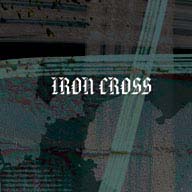
But let’s start with a very basic question. Segor, although you and your bands are pretty well known in Armenia, the Heavy Metal fans from central Europe hardly know anything about BLOOD COVENANT and your other projects. Your first band was called IRON CROSS and started in 2001. Can you tell us please tell us something about IRON CROSS?
Yes, you are right, IRON CROSS was formed in 2001 by me and our drummer Garegin. At first there were three of us and then our former bass guitar player Avag and vocalist Dave joined the group. We played Thrash/Death Metal.
When did you get into Heavy Metal? Was there a special occassion, maybe a special band or album, which got you into Heavy Metal?
Well, you wouldn’t want to call it Heavy Metal, because the music we perform is actually Symphonic Black Metal. In 2001 I started listening to Christian Black Metal bands and it was my inspiration to perform Black Metal. I would also like to mention that I first fell in love with Black and Death Metal when I was 12.
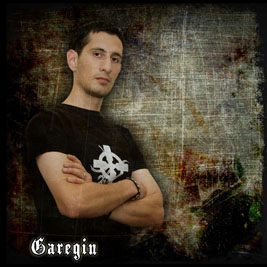
In 2003 you changed the band’s name to BLOOD COVENANT. You also started heading into a different direction music-wise. While IRON CROSS played a mix of Thrash and Death Metal, BLOOD COVENANT might best be described as a Symphonic Black Metal act. What were the reasons for this style-change?
The reason was that I was looking for a brighter style during that period as well as Symphonic Black Metal was more dear to me.
I have to say musically BLOOD COVENANT’s debut album „The Day of Lord“ (2003) is a huge step forward compared to the IRON CROSS demo. You seem to have evolved much as musicians
between 2001 and 2003. It’s like a totally different band, really professional. What do you think were the main reasons for getting such a professional debut album with BLOOD COVENANT?
Thanks for the kind words. You are right, we took a step forward in terms of professionalism. The reason was both the change of style and the fact that our debut album was recorded in a professional studio in 2003. And we worked really hard to evolve. Besides, I became the vocalist of the band, so maybe it had some impact on the positive change, too.
One of my favourite tracks on „The Day of Lord“ is „Old Cross“. I especially love the guitar leads starting around 2:50. They sound to me, like Scandinavian Black Metal is a huge influence for you. Am I right? What are your musical influences?
Exactly, our greatest influences and inspiration are Norwegian Black Metal Bands, for example, Extol, Antestor to name a few.
In 2007 you released the follow-up record „The Blood of the New Covenant“. I can’t help but notice another slight change in style. On the one hand your music has become more brutal and heavier as compared to „The Day of Lord“. For example a song like „The Choice“ is really harsh and aggressive. On the other you’ve become more melodic and heading into a more classic Heavy Metal direction, with a clear voice. For example on „Holy Sanctuary“. Was it a deliberate decision to broaden your style or did it evolve that way naturally?
I have to say that Black Metal consists of Heavy Metal, Thrash Metal, Death Metal, Power Metal and Progressive Metal. So we started to evolve by including different styles and it all happened quite naturally.
Two years later, in 2009, you released a very special single. You recorded a song called „At the Cross“, which in fact is an old Armenian church hymn. How do Metal and church hymns go together? Are there similar harmonies or melodies, for example? Was it difficult to arrange it for a Metal band?
Actually Church music is very similar to Doom Metal, that’s why it was quite easy for us to arrange both styles. So in that single we used a traditional Armenian folk instrument called “Duduk“ and we came up with a very interesting Doom Black Metal style.
What was it like working with a Duduk? Were there any problems to record it and perform it live together with these loud guitars and drums?
No, not really. I have to say that it has a very rich sound during our live performances.
Your latest album „The Sign of Time“ was released in 2011. And like all your releases you are offering it as a free download on your website. Why did you take this decision? Did you try to find a label to release or did you plan from the start to release it on your own label Art4God?
Well, the decision to offer it free was for promotion purposes. As to the label, we do our recordings in „Art4God“. „Art4God“ is just our recording studio. However, our album of 2011 was released on „Darknagar Records“ label. Regarding international labels, we have only worked with „Darknagar Records“ so far.
Looking at your songs and album titles it’s quite obvious that your faith as a Christian plays a huge role in your music.
First of all I would like to mention that we are Christians and we believe in Jesus Christ who was crucified 2000 years ago for our sins and was risen from the dead to save us from hell by endowing us with eternal life. God is our life, and besides, you are right, our faith in Lord Jesus plays a huge role in our music, as we want to show the love of God and the hatred of Satan towards mankind.
So, are you playing in BLOOD COVENANT to worship god? Or is it a means to get the message out to other people?
We play our music for both purposes mentioned by you, that is, to spread the good news and worship God.
I’m sure a lot of people have asked you this question. So please forgive me if I do the same: how do Black Metal and Christianity go together?
We believe that initially all music styles were created by God, including all metal styles.
I have to say that I respect them as musicians but I don’t accept their ideology. As to having problems because of our faith, it should be noted that there were cases when our band wasn’t allowed to take part in certain festivals by some organizers.
Your father is Arthur Areskin, who was the vocalist of Armenian Metal legends AYAS. He did some vocal recordings for „The Blood of the New Covenant“. What’s it like playing in a band and recording together with your own father? Is he very critical of what you’re doing because he’s a musician himself?
Yes, you are right, Arthur Areskin is my father, and besides the „The Blood of the New Covenant“ he also participated in the recordings of the album „Sign of Time“ in 2011. I wouldn’t say that he is critical of what we are doing. I would rather say that he gives us a good piece of advice as a musician.
 |
| Live at Highland Metalfest, Yerevan (Armenia) |
Well, we are planning to have a live performance with a symphonic orchestra, but the date for that hasn’t yet been decided. Now we are looking for new labels to work with.
We are also planning a tour. As far as things look we soon we have a tour in Brazil to perform with the Brazilian band ANTIDEMON.
Thanks for taking the time. The last words belong to you:
Thank you too for showing interest in our band and I hope you have prosperity and success in everything you do. God bless you!
DISCOGRAPHY:
The Day of Lord (2003)
1. The Day Of Lord (Joel 1:1-2)
2. Blood Of Redemption (John 1:29)
3. Horns Of Jericho (Joshua 6:20)
4. Messiah (Isaiah 9:1-12)
6. The King of Zion (Psalm 2:6-7)
7. Fall Babylon, Fall (Rev. 14:8-11)
The Blood of the New Covenant (2007)
1. Symphony of Eminence (intro)
2. Magnification
3. Dedication
5. The old cross (intro)
6. The old cross
7. Eternal beauty
8. Apocalypse
9. The choice
10. Holy sanctuary
At the Cross (2009)
01. At The Cross (duduk mix)
Sign of the Time (2011)
01. Intro (Instrumental)
02. Sign of time
03. Unseen war
04. The call
05. The funeral of the dark kingdom
06. Fall Babylon
07. Hayr Mer
08. At the cross
09. Corruptible reflection of reality
10. Golgotha
11. Metanoia
12. Faithful
Wednesday 5 September 2012
RUINS OF FAITH
Black Metal
Vakhtang Tskhvitava – Bass, Keyboards
Nikoloz Rukhadze – Drums
Vasil Doiashvili – Vocals, Guitars
You can't talk about the Georgian Metal scene without talking about Vasil Doiashvili. Not only is Vasil one of the most prolific metal musicians in the Caucasus, performing with numerous bands like IM NEBEL or ILLUMINATED, he's also THE pioneer when it comes to the evolution of Black Metal in the Caucasus in the early 1990s. Today the "father of Georgian Black Metal" is the mainman of the Symphonic Black Metal outfit RUINS OF FAITH from Tbilisi, who released the formidable album "To the Shrines of Ancestors" in 2006. But let’s start at the
beginning. Vasil, you were one of the first musicians to play Metal in Georgia.
You already started in the late 1980s with your first band DARK HEAVEN. Could
you please introduce DARK HEAVEN to us?
DARK HEAVEN formed in 1988. This band was in fact the first Melodic
Death Metal band in Georgia. Regarding the line-up it was pretty standard: we
had three guitars, bass, vocals and drums. We were young and not really professional.
After about one year of rehearsing we recorded a mini album titled “Dark
Heaven” in the Marjanishvili Theater music studio.
Is there a chance to still
listen to it? Maybe soundfiles?
No. It was recorded in four hours, because we didn’t have the money
to pay the studio. The songs were recorded on magnetic tapes. Unfortunately all
sound files are lost today.
Did the studio owners have
experience with Extreme Metal back then in the late 1980s?
No, the studio was very old. I think the equipment was from the
1960s or 1970s. And of course it was no Metal studio. There were no studios and
producers who had any experience with Heavy Metal in Tbilisi at that time.
When you started with Dark
Heaven it was still in the Soviet Era, before Georgia became independent on the
9th of April 1991. What was it like playing Metal in the Soviet Union? Where
did you buy albums, for example? How did you find out about Heavy Metal in the
Soviet Union?
Playing Death Metal in the Soviet era was a disaster: horrible
instruments, bad rehearsal spaces, no stage experience whatsoever … Also this
style of metal was something which was shockingly new.
Not even the Georgian
Hard’n’Heavy musicians of that time did understand what we were trying to
achieve with growling vocals. But I can say it’s not a big difference to today,
haha… Anyway, metal music is not popular in Georgia and I think this situation
will still last for a long time. Bands must emigrate to Europe for a normal
existence in my opinion.
Were there any other Metal bands around in Georgia in the 1980s/early 1990s, besides Dark Heaven?
Yes, there were a couple of thrash and hard’n’heavy metal bands:
MORYTUR, DOUBLE CROSS, CORRUPTION, WEEKEND, MEMENTO MORI …
Cool, I never heard about
any of those. Can you tell us more about them?
I can’t tell you much, we weren’t really in contact with them. I
just watched some live shows these bands were playing. MORYTUR was a
Death/Thrash Metal band. They recorded an album and emigrated to Russia in
1989. A few months later I got the news from an old friend that they were in
jail. And now they’re all dead. I don’t know what really happened to them. I’m
sure someone knows more about all these bands, unfortunately I don’t.
 |
| Promo shooting for PERGAMO (1995) |
In the early 1990s you
started the Black Metal Pioneers PERGAMO. What happened to DARK HEAVEN? Who
were your main influences to start PERGAMO?
In the 1990s I heard about Black Metal while browsing through radio
channels. I found the frequency of a Russian radio station, which was playing
music by bands like IMMORTAL, BAL-SAGOTH, DIMMU BORGIR and EMPEROR.
I was impressed very much, haha… especially after I found some
pictures and interviews in magazines which came to Georgia with a delay of
about one year after they were published in Europe, haha… In 1993 I went to Turkey. Turkey was more
open for metal music around that time. I also met more metalheads from Europe
there. And I found a couple of metal shops and recording studios in Ankara. I
also played in a Turkish Black Metal band called SARCOPHAGUS. After I returned to
Tbilisi in 1994 I met the guys from my old band DARK HEAVEN and told them about
my experiences in Turkey. I also tried to convince them to change DARK HEAVEN’s
style to Black Metal. They weren’t really happy with my idea and told me I
really was out of my mind, hehe… So Black Metal didn’t really fit to the
Georgian mentality at that time …
After a couple of months, I met a person in Tbilisi who understood my
thoughts and my taste in music. Together we decided to do some kind of experiment. We
recorded our own Black Metal compositions at home. We experimented to become
interesting and we took these home recordings to a famous radio station around.
We never had any hope to get airplay, but we succeeded! Our songs were the
first Black Metal music broadcasted on air in Georgian radio stations!
Not bad at all! It was just you two guys back then,
right?
Yes, but soon after
we talked about turning the project into a real live band. At the beginning of
1994 PERGAMO was finally formed: Three guitars, drums and keyboards. This was
also the reason for me to leave DARK HEAVEN, ‘cause I didn’t have the time for
two bands and my interest for DARK HEAVEN was exhausted.
I remember you telling me
about the legendary first gig of PERGAMO with Corpsepaint, candles , etc. Can
you please tell us more about this show?
The first ever PERGAMO live show took place in 1995. The show was in
some basement in the center of Tbilisi. It was the only place where you could
perform underground music. We made everything for our live concert ourselves: collecting
equipment, making nail-spiked gauntlets, drawing the tickets, making the
corpsepaint …
 |
| Black Metal conquering the Caucasus - The legendary first PERGAMO gig in 1995. |
That’s the Do-it-yourself
underground spirit!
Yeah! When we finally started playing, we were already tired,
hahaha… But for the audience our first Black Metal show was like a bomb
exploding from the stage. I remember, before we were starting to play, the staring
faces of the metalheads for the first five seconds, not understanding what was
going on. Anyway the show went great, there were about 300 metalheads, also the
press. PERGAMO became quite famous in Tbilisi, but it wasn’t good for the band
and also personally for the band members. The press reacted in a very negative way,
like: we were Satanists, and Black Metal was no music. And society must punish
us for such deeds. Also PERGAMO’s quick popularity stirred some hatred from
other Georgian metal bands towards us.
Oh dear… What happened?
After our first live show most of the metal scene and the society was
against us. They thought that Black Metal was a shame for the Georgian Metal scene,
that it was unprofessional, that Black Metal was not music and Black Metal shows
are not acceptable for Georgians.
We got a message telling us we must go to church and be baptized to
help ourselves. We were laughing so much about this message, hahaha. We didn’t
have any problems with the police though. But nevertheless the police really was a problem for metalheads. The police
arrested them for nothing, just because of their long hair. And then they shaved
their hair, that was pure sadism…
Fuck, that’s bad…
After this we played one last live show in the same place in 1996
and then stopped playing live altogether.
The 1990s were a pretty
hard time for Georgia. There was a lot of chaos, crime and problems with electricity
and stuff. How did this affect the development of the metal scene in Georgia?
When you look at the development of the metal scene in Georgia, I think it
really starts around 2002/2003. A lot of new bands were forming, the scene was
getting bigger. What happened around that time? What were the main reasons for
the scene to expand in these years?
Indeed, it was a terrible time for the whole country. But the metal
scene continued existing deep underground or on undercover parties.
Yeah, parties where metal was played unplugged in
some of our friends homes. As you can see the history of metal in Georgia in
the 1990s is even more terrible than what happened in Norway during that time,
hahaha...
Hahaha, awesome!
Anyway, there was no chance to develop and promote metal outside of
Georgia, to show the world that there are interesting metal bands in Georgia.
The only way was to leave the country, because of these problems. This was an inner
conflict for many musicians playing in bands. Realizing that our music had no
future in Georgia we stopped rehearsing and disbanded. In 2000 in Georgia happened big political and economic changes. I
think this was the main reason why the Metal scene in Tbilisi got bigger. And
this is not just about metal, all underground scenes are much more bigger now.
But I’m sure the internet
played a part in this evolution as well, right?
Sure, the internet was very important for Georgia. It already
arrived in the first half of the 1990s, but at that time probably only 10 % of
the people owned a computer. After 2000 the internet was available for 100% of
the people in Tbilisi. I think the internet helped to show the world what was
happening in the Georgian metal scene. Also the people here discovered foreign
bands and metal music styles that they didn’t know before.
In 2001 you started RUINS
OF FAITH. Can you tell us a little more
about RUINS OF FAITH?
In 2001 I had the opportunity to meet some people who made me think
about a new beginning: Vakhtang Ckvitava (Guitars), Igor Smichkov (Keyboards)
and Giorgi Gogidze (Bass). We became friends and together we made our first metal
studio in our home’s basement in 2003. And after inviting Nik Rukhadze (drums) we
started rehearsals.
In 2006 you released your
debut album „To the shrines of Ancestors“. Did you do it all by yourselves or
did you go to a professional studio/producer?
We already started to record our full length album “To The Shrines of
Ancestors” in 2004. We did it in our own studio. It was finished in 2005 and
released on the famous Russian label “Haarbn Productions” in 2006. It was the
big deal for RUINS OF FAITH. CDs were sold in Russia, Europe and Japan. Info
about RUINS OF FAITH was spread on European websites and magazines like Dark
City or Metal Art …
„To the shrines of
ancestors“ reminds me a lot of DARK FUNERAL and SETHERIAL. What were your
influences when you were writing the album?
My favorite bands are Emperor,
DIMMU BORGIR, BATHORY, MARDUK, DEATH … Actually, when we were working on the album,
we tried not to listen to a lot of other music, because we wanted to get rid of
all influences. Our mission was to make some music of our own, and our own
vision of Black and Death Metal. Really, it was no easy task. I think we created
something special. Maybe the music reminds of famous old school and new
European Black Metal, but I think this is usual for this genre. The main theme
of the lyrics of the album were philosophical and mythological topics.
What do you mean with
“philosophical”?
 |
| Vasil in the Warsteiner Pub, Vashvlovani St, Tbilisi 2012 |
Ah, now I understand what
the bandname is about! And great to hear that you’re working on a new album! By
the way, how does society in Georgia react to Black Metal today? Georgia is
still a very religious country, the church is still pretty powerful, right? Did
you ever have problems because of RUINS OF FAITH?
Yes, we had problems and not only RUINS OF FAITH… This problem is for all the underground music
scenes of Georgia. In the eyes of our Orthodox Church we all are the same shit.
As you know, RUINS OF FAITH don’t use satanic lyrics and stuff, but anyway the
Church hates us. Also 90% of the society is zombified by the church.
What do you think about the
development of Black Metal compared to the early 1990s. I mean, in the 1990s
Black Metal was dangerous, now bands like Immortal or Emperor are headlining
Wacken. What do you think about it? Is it a good thing that extreme metal
reaches the masses or would you prefer it to stay extreme and underground?
I think getting mainstream is normal and usual. I just don’t like
radical stylistic changes in some of the legendary Black/Death metal bands,
like SATYRICON, ULVER, SAMAEL or ANCIENT.
Being the „father“ of
Georgian Black Metal, what do you think about your „sons“, current bands like
PSYCHONAUT 4 or DIABOLUS SANCTUS?
Yes! These guys are heroes! Performing
such extreme suicidal shows in Tbilisi! This is really dangerous for them, but
think they don’t give a fuck about it, also they already are popular in Europe.
And as far as I know PSYCHONAUT 4 are preparing their first Euro trip this
autumn, so I wish them a nice fucking trip!
DIABOLUS SANCTUS are my good friends, I’m supporting this band. They
are deep into these satanic themes and it is rumoured that they burned some
icons and crosses, which is very controversial in such a religious country as Georgia.
They also wear corpse paint and inverted crosses on stage. They have released a
demo album, titled “Voice Of Satan”. Now DIABOLUS SANCTUS are working on a new album.
What is your wish for the
Georgian scene? Is there anything you’d like to change, if you had the power?
Nothing!
DISCOGRAPHY
To the Shrines of Ancestors
2006
1. To The Shrines Of Ancestors (part 1)
2. Pagan
3. Father Fire
4. The Everquest
5. To The Shrines Of Ancestors (part 2)
6. Ruins Of Faith
7. Mournbringer
8. Solar Eclipse
9. Murvan Kru
Subscribe to:
Posts (Atom)


